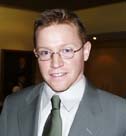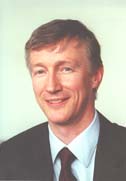Leadership & Innovation
Matthew Anderson Leads Development of Integrated Community-Hospital Information System

This summer University Health Network (UHN) and the Toronto Community Care Access Centre (CCAC) launched a new initiative to integrate their computer systems, under the leadership of Matthew Anderson (MHSc 1997), Vice President and Chief Information Officer (CIO) at UHN and recently appointed to the joint CIO position at Toronto CCAC.
The new partnership initiative will develop an Information Systems operating plan for the Toronto CCAC. Matthew's leadership drives collaboration, consistency, standards, and cooperation to facilitate the electronic sharing of key referral information among community providers and partner hospitals.
Matthew describes the benefit of the new integrated UHN/CCAC information system, versus the traditional silo approach: "Once we build this technology bridge to integrate confidential electronic patient records, it will mean healthcare professionals at both organizations will have enhanced access to information which will help streamline patient referrals and allow physicians and clinicians access to important clinical information about patients to enhance their decision-making."
Matthew began working at the UHN in 1998 as Administrative Director for Shared Information Management Services. He has implemented a number of electronic tools to enhance the UHN's clinical and administrative functions including computerized physician order entry and results review system, electronic ECG system, and on-line pathology orders, as well as the implementation of an automated discharge summary, and development of intuitive voice recognition tools – initiatives that have had a dramatic impact on reducing the paper record, changing dictation practices, and resulting in a projected cost reduction of 75%.
Alumni Profiles
Alumni of the Department of Health Policy, Management and Evaluation (HPME) are involved in a broad range of leadership activities across the health care sector. To promote greater awareness of the many accomplishments and innovations of this diverse group, we are pleased to include alumni profiles as a regular feature of the Society of Graduates newsletter.
This issue features Malcolm Moffat, President and CEO of St. John's Rehabilitation Hospital in Toronto, Chair of the Toronto Acquired Brain Injury (ABI) Network and Adjunct Faculty in the Department of HPME.
Malcolm Moffat - Recipient of 2004 SOG Leadership Award

“This is a great place” Malcolm Moffat says of St. John's Rehabilitation Hospital and ushers me into his office, where a framed certificate attests to his having received the Society of Graduates' Leadership Achievement Award at our recent Annual General Meeting in October.
Had McGill University accepted Malcolm into medical school some twenty-five years ago and satisfied his childhood dream, he might have met me today in a white coat. Instead, he studied cell and molecular and developmental biology and worked in a laboratory for 2 years on chemotherapy research. His managerial talent and an encouraging supervisor led to his having increasing responsibilities there for purchasing, scheduling, budget and this, combined with his innate liking for people, made him seek out the UofT Health Administration program, from which he graduated in 1983. A practicum project as a student on closing the Chedoke emergency department [a project that ultimately took ten years to complete] educated him about the perspectives of communities and health care consumers.
From his first job, projecting the aging Baby Boomers' needs for acute care beds, Malcolm has always focused on a systems approach to health care service planning. This was reinforced at the District Health Council and in his role as administrative director of Sunnybrook's surgical program, introducing program management there. His approach is always to consult widely, and involve colleagues across the continuum of care: “you have to talk to a lot of people, get their points of view, get them onside”. He feels his listening and conflict-resolution skills, probably innately above average, were honed during his tenure as a Facilities Planner at Sunnybrook, responsible for allocating space: “it is the toughest job, you can't possibly please everyone”.
After 10 years as a vice-president at St. Michael's Hospital, where he helped to introduce program management, and oversaw the renovation or replacement of over 500,000 sqaure feet of space, Malcolm moved to St. John's Rehab, as President and CEO. And his first challenge was not long in coming: three days into his tenure, SARS broke out in nearby Scarborough and St. John's like all GTA hospitals faced serious constraints on most of its activity. Even more difficult was the second phase of SARS [‘SARS II.'], brought to light by St. John's staff who identified a group of their patients with suspicious respiratory symptoms after SARS had already been considered over. A still-new leader, Malcolm had to carry their concerns forward to the Ministry, Public Health, and to colleagues in the health care system; the experience left him, among other things, with the highest regard for the St. John's staff professionalism and their collegial support of one another.
Malcolm is especially glad of the opportunity St. John's provides, to focus on the continuity of care and to partner with caregivers across the health care spectrum from community care through acute care and rehabilitation. He has been involved in several key partnering initiatives, for example, one in neuroscience and one in transplantation, which involve extensive partnering with specialized acute care units [at Sunnybrook & Womens, and Baycrest Centre for neurosciences, and the University Health Network for transplantation]. A current GTA-wide partnership to reduce waiting times for total joint replacements finds St. John's again at the table.
As well as integrating clinical care, St. John's stresses integration in research and in education; for example, clinicians learning about specialized rehabilitation of burn patients learn at the same time about the care offered in the acute hospital setting (at Sunnybrook and Womens) and the implications of what they do, as the patient re-enters a community care setting. Cross-appointments help facilitate these connections, and staff are encouraged to maintain relationships with colleagues in other sectors, to talk with them – and, even more important, to listen - about their requirements. Malcolm is proud of St. John's involvement in the GTA Rehab and the ABI Networks : “they show what people can do if they come together with a passion to move things forward”.
Malcolm is a firm believer in the advantages of program management [instead of a department-based structure] but says that matrix management with a dual reporting relationship [eg., Professional Practice Leaders for allied health workers] can only work well, as long as there are very clear role definitions and division of labour. It takes a lot of work and constant communication to sustain a team approach and shared vision, but the very good results to be achieved are worth it, he believes. As Chief Operating Officer, Toronto Bayview Regional Cancer Centre, he helped pioneer multi-disciplinary clinics, where patients could consult all the relevant professionals in one clinic rather than having separate clinics for chemotherapy, radiation, surgery, etc. This integrated, patient-focussed model, has since been adopted by several cancer care centres across the country.
Malcolm is clearly a leader who listens and consults, but who is not content to do that alone. Throughout a long and varied career he patiently and persistently works toward integrating and maximizing continuity of care, enhancing health care services and better meeting patients' needs.


